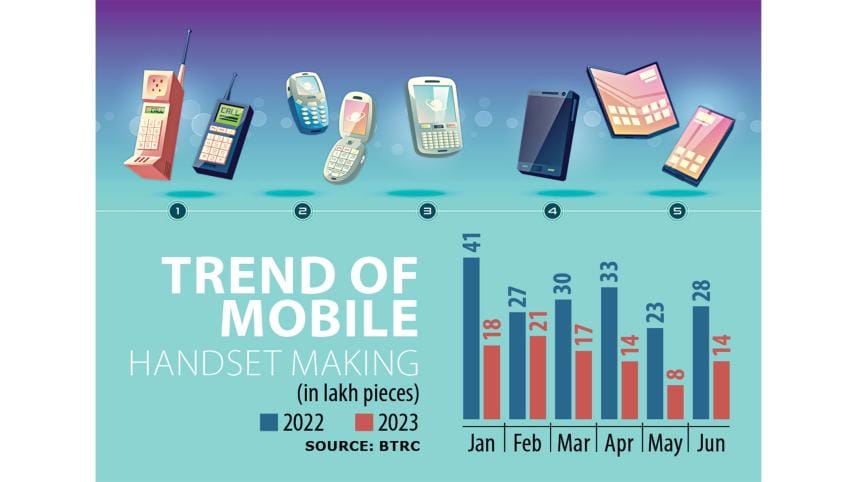Local handset making plunges

The grim scenario of the mobile manufacturing industry in Bangladesh continues to persist as local production plunged by half in the first six months of 2023, primarily due to the expanding grey market.
Local manufacturers produced 96 lakh handsets from January to June this year, down 48 per cent from 1.85 crore units in the same period a year earlier, according to the latest data of Bangladesh Telecommunication Regulatory Commission (BTRC).
According to the Mobile Phone Industry Owners' Association of Bangladesh, smartphone sales plunged by 42 per cent to 33 lakh in the first half of the current year compared to the same period of 2022.
Meanwhile, feature phone sales plummeted by 40 per cent year-on-year to 46 lakh.
Industry people said import costs have increased due to the taka's sharp depreciation against the US dollar. Moreover, there is a shortage of the greenback, making it challenging to open letters of credit.
At the same time, the government has substantially increased the VAT on local manufacturing. All these factors together increased the price of locally manufactured phones.
Also, a section of unscrupulous businesspeople swarmed the market with phones imported through unauthorised channels.
And as they do not pay taxes for these devices, their devices are cheaper and thereby lure customers suffering from economic woes.
"The key factor in the downturn of the market is the expansion of the grey market," Rizwanul Haque, vice-president of the Mobile Phone Industry Owners' Association of Bangladesh, told The Daily Star.
He said they witnessed some sales during the last two months as it is peak season for handset sales. However, the sales were not substantial.
Handset purchases have become more infrequent in recent times as people only buy them when compelled to do so considering the worsening economic situation, he said.
Previously, consumers were more inclined to make phone purchases on a regular basis.
This shift comes as increased inflationary pressure, which is running at a decade high, has led individuals to prioritise essential needs over discretionary spending.
Production of handsets in Bangladesh has made impressive strides in recent years, aided by the government's huge tax benefits unveiled in fiscal year 2017-18.
Since then, 15 plants have been set up, creating jobs for around 15,000 people.
Prior to the last fiscal year that began on July 1, 2022, there was about a 58 per cent tax on smartphone imports whereas the tax on locally assembled and manufactured handsets was 15 per cent to 20 per cent.
But now, it stands at 30 per cent to 35 per cent because of the imposition of 5 per cent VAT on each of the three stages of sales -- from the factory to distributors and retailers.
And in a further blow to manufacturers, the revenue authority has proposed imposing more VAT at the production stage.
From the upcoming fiscal year, 2 per cent VAT will be applicable for the first time on production making use of wholly locally made components.
Moreover, the VAT applicable on handsets produced with at least two components made locally has been increased from 3 per cent to 5 per cent.
Similarly, the VAT on handsets assembled wholly with imported components has been increased from 5 per cent to 7.5 per cent.
Industry people have appealed to the government that if reducing taxes seems unfeasible, alternative measures should be implemented to eradicate the grey market.
The solution is to launch the National Equipment Identity Register (NEIR) to safeguard the local smartphone manufacturing sector.
Set up by the BTRC in 2021, the NEIR is a system to ensure the use of valid mobile devices in the country through the incorporation of their IMEI with the customer's national identification and SIM numbers.
However, its main functions, such as blocking fake, unauthorised or cloned handsets in the network, are not yet running.
Earlier, Mohammad Mesbah Uddin, chief marketing officer of Fair Electronics, Samsung's local assembly partner, said although Bangladesh was a pioneer in setting up the NEIR, other countries are implementing it before Bangladesh.
For example, Pakistan and Nepal are running the NEIR to prevent illegal trade and promote local manufacturing opportunities.
"The government has already invested in the NEIR infrastructure but has not started blocking illegally imported mobile phones," he added.



 For all latest news, follow The Daily Star's Google News channel.
For all latest news, follow The Daily Star's Google News channel.
Comments